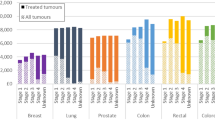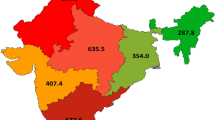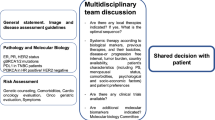Abstract
Purpose of Review
One of the most important recent advances in the management of cancer patients have become the development of guidelines. Guidelines are usually evidence-based or international consensus guidelines. Those guidelines may not be applicable worldwide, especially where resources are limited. This prompted initiatives for the development of resource-stratified guidelines so that health care providers and authorities can do the best they can with the resources they have, while working on improving their resources. We will describe the process of development of those guidelines and briefly review recommendations for awareness, screening, diagnosis, and treatment of breast cancer, focusing on countries and special populations with limited resources.
Recent Findings
The World Health Organization (WHO) described three resource scenarios (low-resource, middle-resource, and high-resource scenarios) in order to facilitate the establishment of national cancer control plans. The Breast Health Global Initiative (BHGI), as an initiative group with goals to improve the care of patients with breast cancer in low- and mid-resource settings, identified four levels of resource availability (basic, limited, enhanced, and maximal) with comprehensive sets of recommendations for each. BHGI published resource-stratified breast cancer guidelines starting in 2006, and later on updated them and focused on implementation and health systems. The National Comprehensive Cancer Network (NCCN) initiated a program, building upon the BHGI experience to resource stratify cancer treatment guidelines across multiple cancer types and published NCCN Framework for resource stratification in breast cancer in 2016. Subsequently, the NCCN has published multiple additional resource stratification frameworks that use slightly different definitions of resource level than use by the BHGI. The American Society of Clinical Oncology (ASCO) has also assembled a Guidelines Advisory Group for Resource Stratification for different cancers, and published its first comprehensive resource-stratified guidelines for cancer of the cervix.
Summary
International efforts to improve management and reduce disparities in the outcome of breast cancer patients’ worldwide focus on recommendations for better allocation of available resources in different countries. The WHO, BHGI, NCCN, ASCO, and other international initiatives issued various resource-stratified guidelines (RSG) based on levels of resources in different countries. We shed the light on the development of these guidelines and discuss awareness, prevention of advanced disease at presentation, and management. Future research is needed to update and improve dissemination and implementation of RSG, as well as building infrastructure, reforming of health systems, and better allocating resources.


Similar content being viewed by others
References
Papers of particular interest, published recently, have been highlighted as: •• Of major importance
International Agency for Research on Cancer. World Health Organization, gco.iarc.fr/today/home, Accessed March 29, 2018.
Anderson BO, Ilbawi AM, El Saghir NS. Breast cancer in low and middle income countries (LMICs): a shifting tide in global health. Breast J. 2014;21:111–8. https://doi.org/10.1111/tbj.12357.
WHO. National cancer control programmes: policies and managerial guidelines. Geneva: WHO; 2002. Access at http://wwwwhoint/cancer/media/en/408pdf, April 17, 2018
Anderson BO, Braun S, Carlson RW, et al. Overview of breast health care guidelines for countries with limited resources. Breast J. 2003;2:S42–5035.
Anderson BO, Yip C, Ramsey SD, et al. Breast cancer in limited-resource countries: health care systems and public policy. Breast J. 2006;12(s1):S54–69.
Anderson BO, Cazap E, El Saghir NS, et al. Optimisation of breast cancer management in low-resource and middle-resource countries: executive summary of the Breast Health Global Initiative consensus, 2010. Lancet Oncol. 2011;12:387–98.
•• Distelhorst SR, Cleary JF, Ganz PA, et al. Optimisation of the continuum of supportive and palliative care for patients with breast cancer in low-income and middle-income countries: executive summary of the Breast Health Global Initiative, 2014. Lancet Oncol. 2015;16(3):e137–47. https://doi.org/10.1016/S1470-2045(14)70457-7. ISSN 1470–2045, (http://www.sciencedirect.com/science/article/pii/S1470204514704577). This article combined the three successive BHGI panel recommendations into a comprehensive summary, including the importance of supportive and palliative care in breast cancer patients in LMICs as much as recommendations with curative intents.
Anderson BO, Shyyan R, Eniu A, Smith RA, Yip CH, Bese NS, et al. Breast cancer in limited-resource countries: an overview of the Breast Health Global Initiative 2005 guidelines. Breast J. 2006 Jan-Feb;12 Suppl 1:S3–15. https://doi.org/10.1111/j.1075-122X.2006.00199.x.
•• Carlson RW, Scavone JL, Koh WJ, et al. NCCN Framework for resource stratification: a framework for providing and improving global quality oncology care. J Natl Compr Cancer Netw. 2016;14:961–9. This study shows the need and necessity of having RSGs to treat better cancer patients in LMICs, and offers the most updated RSGs made in 2016 by the NCCN Framework.
Eniu A, Carlson RW, El Saghir NS, Bines J, Bese NS, Vorobiof D, et al. Guideline implementation for breast healthcare in low- and middle-income countries: treatment resource allocation. Cancer. 2008 Oct 15;113(8 Suppl):2269–81. https://doi.org/10.1002/cncr.23843.
National Comprehensive Cancer Network. NCCN Harmonized GuidelinesTM for Sub-Saharan Africa. Breast Cancer. (Version 2.2017 – November 3, 2017). https://www.nccn.org/professionals/physician_gls/pdf/breast_harmonized-africa.pdf. Accessed June 24 2018.
Erickson Foster J, Velasco JM, Hieken TJ. Adverse outcomes associated with noncompliance with melanoma treatment guidelines. Ann Surg Oncol. 2008;15:2395–402. https://doi.org/10.1245/s10434-008-0021-0.
Neubauer MA, Hoverman JR, Kolodziej, et al. Cost effectiveness of evidence-based treatment guidelines for the treatment of non–small-cell lung cancer in the community setting. J Oncol Pract. 2010;6(1):12–8. https://doi.org/10.1200/JOP.091058.
Visser BC, Ma Y, Zak Y, Poultsides GA, Norton JA, Rhoads KF. Failure to comply with NCCN Guidelines for the management of pancreatic cancer compromises outcomes. HPB. 2012;14:539–47. https://doi.org/10.1111/j.1477-2574.2012.00496.x.
Molena D, Mungo B, Stem M, Poupore AK, Chen SY, Lidor AO. Does quality of care matter? A study of adherence to National Comprehensive Cancer Network Guidelines for patients with locally advanced esophageal cancer. J Gastrointest Surg. 2015;19:1739–47. https://doi.org/10.1007/s11605-015-2899-8.
Delhorme J, Antoni D, Mak KS, et al. Treatment that follows guidelines closely dramatically improves overall survival of patients with anal canal and margin cancers. Crit Rev Oncol Hematol. 2016;101:131–8. https://doi.org/10.1016/j.critrevonc.2016.03.001. ISSN 1040–8428. (http://www.sciencedirect.com/science/article/pii/S1040842816300427)
Schwam ZG, Sosa JA, Roman S, et al. Receipt of care discordant with practice guidelines is associated with compromised overall survival in nasopharyngeal carcinoma. Clin Oncol (R Coll Radiol). 2016;28:1–8.
Yip CH, Smith RA, Anderson BO, et al. Guideline implementation for breast healthcare in low- and middle-income countries: early detection resource allocation. Cancer. 2008;113(8 Suppl):2244–56.
Dey S. Preventing breast cancer in LMICs via screening and/or early detection: the real and the surreal. World J Clin Oncol. 2014;5:509–19.
El Saghir NS, Farhat RA, Charara RN, et al. Enhancing cancer care in areas of limited resources: our next steps. Future Oncol. 2014;10:1953–65.
Hayek F, Berro B, Fayad W. Awareness campaign for the early detection of growth disorders in public school children in North Lebanon. Ethn Dis. 2016;26(3):417–26. https://doi.org/10.18865/ed.26.3.417.
Shyyan R, Sener SF, Anderson BO, Fernández Garrote LM, Hortobágyi GN, Ibarra JA Jr, et al. Guideline implementation for breast healthcare in low- and middle-income countries: diagnosis resource allocation. Cancer. 2008;113(8 Suppl):2257–68.
Mayor S. Radiation in combination with immune-checkpoint inhibitors. Lancet Oncol. 2015;16:e162. https://doi.org/10.1016/S1470-2045(15)70118-X.
Rugo HS, Barve A, Waller CF, et al. Heritage: a phase III safety and efficacy trial of the proposed trastuzumab biosimilar Myl-1401O versus Herceptin. ASCO Annual Meeting; Chicago, IL; Jun 3–7, 2016. LBA503.
Cardoso E, Senkus A, Costa E, et al. 4th ESO-ESMO International Consensus Guidelines for Advanced Breast Cancer (ABC4). Ann Oncol. 2018. https://academic.oup.com/annonc/advance-article/doi/10.1093/annonc/mdy192/5055519.
Yip CH, Cazap E, Anderson BO, et al. Breast cancer management in middle-resource countries: consensus statement from the Breast Health Global Initiative. Breast, April 2011; 20 (TBD).
Sullivan R, Alatise OI, Anderson BO, Audisio R, Autier P, Aggarwal A, et al. Global cancer surgery: delivering safe, affordable, and timely cancer surgery. Lancet Oncol. 2015;16:1193–224.
Grover S, Xu MJ, Yeager A, et al. A systematic review of radiotherapy capacity in low- and middle-income countries. Front Oncol. 2015;4:380. https://doi.org/10.3389/fonc.2014.00380. eCollection 2014
Atun R, Jaffray DA, Barton MB, Bray F, Baumann M, Vikram B, et al. Expanding global access to radiotherapy. Lancet Oncol. 2015;16:1153–86.
Robertson J, Barr R, Shulman LN, Forte GB, Magrini N. Essential medicines for cancer: WHO recommendations and national priorities. Bull World Health Organ. 2016;94:735–42. https://doi.org/10.2471/BLT.15.163998.
Pivot X, Romieu G, Debled M, et al. 6 months versus 12 months of adjuvant trastuzumab for patients with HER2-positive early breast cancer (PHARE): a randomised phase 3 trial. Lancet Oncol. 2013;14(8):741–8.
Joensuu H, Fraser J, Wildiers H, et al. A randomized phase III study of adjuvant trastuzumab for a duration of 9 weeks versus 1 year, combined with adjuvant taxane-anthracycline chemotherapy, for early HER2-positive breast cancer. The Synergism Or Long Duration (SOLD) trial. Presented at: 2017 San Antonio Breast Cancer Symposium; December 5–9, 2017; San Antonio, TX. Abstract GS3–04.
Joensuu H, Bono P, Kataja V, Alanko T, Kokko R, Asola R, et al. Fluorouracil, epirubicin, and cyclophosphamide with either docetaxel or vinorelbine, with or without trastuzumab, as adjuvant treatments of breast cancer: final results of the FinHer Trial. J Clin Oncol. 2009;27:5685–92.
•• El Saghir NS, Kreidieh FY, El-Baba S, Anderson BO. Management of locally advanced and metastatic breast cancer: guidelines, infrastructures and low resource settings. Breast Cancer Manage. 2016;5(2):69–77. This article tackles a specific group of patients in LMICs, which is the locally advanced/metastatic breast cancer group. It is important to know that resources needed in the management of cancer at this advanced stage requires proper infrastructure that is not always present in low-resource countries. In this article, disparities in the breast cancer outcomes and requirements for optimal management are reviewed, including infrastructure needs for optimal surgery, radiation treatment, and systemic therapy. In addition, the article mentions controversies related to drug pricing and availability and process and delays in registration of new drugs as well as resource stratification.
El Saghir NS, Adebamowo CA, Anderson BO, et al. Breast cancer management in low resource countries (LRCs): consensus statement from the Breast Health Global Initiative. Breast. 2011;20:S3–S11.
Ganz PA, Yip CH, Gralow JR, Distelhorst SR, Albain KS, Andersen BL, et al. Supportive care after curative treatment for breast cancer (survivorship care): resource allocations in low- and middle-income countries. A Breast Health Global Initiative 2013 consensus statement. Breast. 2013;22:606–15.
Lopes G, Eniu A, El Saghir N. Developing resource-stratified guidelines in oncology to improve cancer care worldwide. 2015. Asco Post, https://am.asco.org/developing-resource-stratified-guidelines-oncology-improve-cancer-care-worldwide.
Cazap E, Distelhorst SR, Anderson BO. Implementation science and breast cancer control: a Breast Health Global Initiative (BHGI) perspective from the 2010 Global Summit. Breast. 2011;20(suppl 2):S1–2.
Charara RN, Kreidieh FY, Farhat RA, al-Feghali KA, Khoury KE, Haydar A, et al. Practice and impact of multidisciplinary tumor boards on patient management: a prospective study. J Glob Oncol. 2016;3:242–9. https://doi.org/10.1200/JGO.2016.004960.
El Saghir NS, Carlson RW, Khoury KE, Fallowfield L. Tumor boards: optimizing the structure and improving efficiency of multidisciplinary management of cancer patients worldwide. Am Soc Clin Oncol Educ Book. 2014;2014:e461–6.
El Saghir N, El Asmar N, Hajj C, et al. Survey of utilization of multidisciplinary management tumor boards in Arab countries. Breast. 2011;20(Suppl 2):S70–4.
El Saghir NS, Charara RN, Kreidieh FY, et al. Global practice and efficiency of multidisciplinary tumor boards: results of an American Society of Clinical Oncology international survey. J Global Oncol. 2015;1:57–64.
WHO. Health systems: equity; http://www.who.int/healthsystems/topics/equity/en/ Accessed March 30, 3018.
Hortobagyi GN, El-Saghir NS, Cufer T, et al. The American Society of Clinical Oncology’s efforts to support global cancer medicine. J Clin Oncol. 2016;34(1):76–82. https://doi.org/10.1200/JCO.2015.61.7696.
B O. Anderson, A Dvaladze, A Ilbawi, et al. Prevention: breast cancer risk factors and risk reduction https://www.fredhutch.org/en/labs/phs/projects/breast-cancer-initiative_2-5/knowledge-summaries.html. Accessed on June 26, 2018.
B O. Anderson, A Dvaladze, A Ilbawi, et al. Early detection: screening mammography programs. https://www.fredhutch.org/en/labs/phs/projects/breast-cancer-initiative_2-5/knowledge-summaries.html. Accessed on June 26, 2018.
B. O. Anderson, A Dvaladze, A Ilbawi, et al. Treatment: systemic therapy: chemotherapy for breast cancer. https://www.fredhutch.org/en/labs/phs/projects/breast-cancer-initiative_2-5/knowledge-summaries.html. Accessed on June 26, 2018.
B O. Anderson, A Dvaladze, A Ilbawi et al. Palliative care during treatment for breast cancer. https://www.fredhutch.org/en/labs/phs/projects/breast-cancer-initiative_2-5/knowledge-summaries.html. Accessed on June 26, 2018.
El Saghir NS. Conflict medicine and cancer care in refugees and displaced people. Asco Connection 2017, https://connection.asco.org/blogs/conflict-medicine-and-cancer-care-refugees-and-displaced-people.
•• El Saghir NS, Perez de Celis ES, Fares JE, Sullivan R. Cancer care for refugees and displaced populations: Middle East conflicts and global natural disasters. 2018 American Society of Clinical Oncology ASCO Educational Book: http://ascopubs.org/doi/abs/10.1200/EDBK_201365. This article brings a new dimension to the subject of underprivileged cancer patients, which are refugees and displaced populations. It incites the WHO, UN, BHGI, ASCO, NCCN, and others to think about solutions for cancer patients in these communities.
Author information
Authors and Affiliations
Corresponding author
Ethics declarations
Conflict of Interest
The authors declare that they have no competing interests.
Human and Animal Rights and Informed Consent
This article does not contain any studies with human or animal subjects performed by any of the authors.
Additional information
This article is part of the Topical Collection on Global Breast Cancer
Rights and permissions
About this article
Cite this article
El Saghir, N.S., El Tomb, P.A. & Carlson, R.W. Breast Cancer Diagnosis and Treatment in Low- and Mid-Resource Settings: the Role of Resource-Stratified Clinical Practice Guidelines. Curr Breast Cancer Rep 10, 187–195 (2018). https://doi.org/10.1007/s12609-018-0287-6
Published:
Issue Date:
DOI: https://doi.org/10.1007/s12609-018-0287-6




